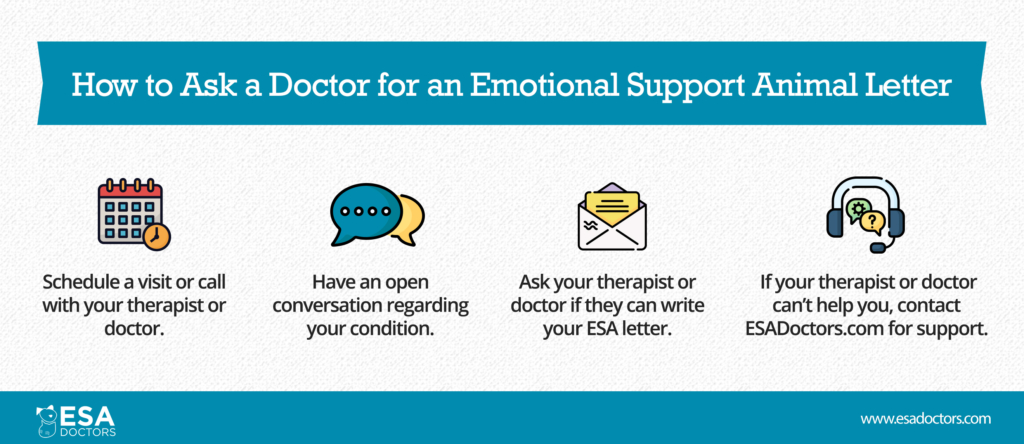If you asked your therapist for an ESA letter and they said no, don’t give up! It can be hard to hear a rejection after getting your hopes up about getting an emotional support animal, but keep in mind that there are lots of reasons a therapist might deny your request that have nothing to do with whether you really need and deserve one. If your therapist says no to your ESA request, below are the steps you can take to continue your request for an ESA letter.
Don’t take a refusal personally. Your therapist’s decision very often just reflects a lack of familiarity with ESAs or workplace policies rather than a judgment about your needs. Many people who are initially turned down for an emotional support animal get the ESA letter they deserve later on. In this guide, we’ll explain exactly what to do if your therapist says no to your ESA request.
Step 1: Ask your therapist to reconsider with additional information
If your therapist has declined to write an ESA letter, the first step is to have an open conversation about their concerns. This doesn’t need to be confrontational — just an honest discussion to understand where they’re coming from.
Start by simply asking, “Can you help me understand why you’re not comfortable writing an ESA letter?” Their answer might surprise you. Maybe they just need more information about how your pet helps you, or perhaps they have concerns you can easily address.
Share your personal experiences. For example: “When I’m having a panic attack, petting my cat helps slow my breathing,” or “Having my dog to care for gives me a reason to get out of bed on my worst depression days.” Real examples from your life will be much more compelling than abstract research.
If you’ve noticed improvements in your symptoms since having your animal, mention those concrete changes. Maybe you’re sleeping better, experiencing fewer anxiety attacks, or finding it easier to maintain your daily routine. These tangible benefits matter more to your therapist than general statements about how animals help mental health.
If the reluctance to write an ESA letter is due to their lack of knowledge about how the ESA process works, try referring them to HUD’s rules for emotional support animals. They can learn about how ESA letters work and the benefits you’ll get from having one.
Despite your best efforts, some therapists may still decline to write an ESA letter. This could be because they remain uncomfortable with the ESA process, or because their practice or employer has policies prohibiting them from writing such letters. If this happens, it’s important to respect their decision and move on to exploring other options.

Step 2: Find Another Healthcare Professional Who Specializes in ESA Letters
If your current therapist won’t provide an ESA letter despite your best efforts, seeking a second opinion is a perfectly reasonable next step. This doesn’t necessarily mean ending your relationship with your current therapist — you can continue working with them on other aspects of your mental health while consulting with a specialist on the ESA issue.
Start by asking your current therapist for referrals to colleagues who might have more experience with animal-assisted interventions. Even if they’re not comfortable writing an ESA letter themselves, many therapists will be happy to connect you with someone who specializes in this area.
If your therapist doesn’t offer referrals, conduct your own research to find mental health professionals in your area who specialize in or have experience with animal-assisted therapies. Professional directories often allow you to search by specialty, and many therapists mention their areas of expertise on their websites. You want to find someone familiar with the research supporting the benefits of having an ESA in your life or the work done by the Human-Animal Bond Research Institute (HABRI) in studying the positive influence animals have on a person’s physical and mental health.
When reaching out to a new provider, be upfront about your specific interest in getting an ESA letter. This saves time for everyone involved and ensures you find someone who can meet your needs. Ask about their experience with ESAs and their process for evaluation.
Keep in mind that seeing a specialist for an ESA may not be covered by insurance, so ask about fees upfront so you can make an informed decision.
Step 3: Use ESA Doctors as Your Solution
If you were told “no” by your therapist because they don’t do ESA letters, or you’re having a hard time finding an ESA specialist, we offer the perfect solution designed specifically for your situation.
Unlike going to another traditional therapist, where you might face the same lack of understanding or reluctance, ESA Doctors connects you with mental health professionals who are knowledgeable about and supportive of emotional support animals. You won’t waste precious time and emotional energy educating these providers about ESA letters or their benefits — they already understand the role your pet can play in managing mental health conditions.
The mental health professionals at ESA Doctors approach each evaluation with compassion and without judgment. They understand that getting an ESA letter can be stressful, especially after being turned down by your regular therapist. Perhaps most importantly, the healthcare professionals who work with ESA Doctors won’t make you feel like you’re asking for something unusual or inappropriate. They recognize that an emotional support animal can be a legitimate, life-changing part of a mental health plan, not a loophole or special privilege.

Why might a therapist decline to write an ESA letter?
When your therapist says no to writing an ESA letter, it can feel like a personal rejection, like they don’t believe you or don’t think your struggles are severe enough. But in reality, their decision often has nothing to do with the legitimacy of your needs.
Some therapists work for large healthcare organizations with strict policies about what they can and cannot do. Your therapist might actually agree that an ESA would be helpful for you, but their hands are tied by workplace rules that forbid writing these letters. Many healthcare networks and HMOs have blanket policies against ESA letters.
Your therapist might also be in the dark about ESAs altogether. Mental health training programs rarely cover the therapeutic benefits of animals or how to properly document an ESA recommendation. Your therapist might be hesitating simply because they don’t feel knowledgeable enough about ESAs to make this call.
Fear of liability is another big reason therapists say no. Some worry that if they recommend an animal and something goes wrong — maybe the animal causes property damage or you have an allergic reaction — they could somehow be held responsible. This fear is usually overblown but still influences many providers’ decisions.
Then there’s the paperwork problem. Some therapists avoid writing ESA letters because they don’t want to deal with the administrative hassle. They may not know exactly what to include in the letter, what legal standards it needs to meet, or how to properly document it in your medical record.
Finally, some therapists simply have personal biases against ESAs. Maybe they don’t believe in the therapeutic value of animals, or perhaps they’ve had negative experiences with other patients’ requests in the past. While this isn’t fair to you, these preconceived notions can affect their willingness to write an ESA letter.
What’s important to understand is that your therapist’s reluctance usually says more about their situation, knowledge, and comfort level than it does about whether you truly need or deserve an emotional support animal. Their “no” isn’t the final word on your path toward getting an ESA letter.





I am moving into an apartment that has a Paper that needs to be signed for ESA. But I can’t find an able doctor to sign the letter because of company policies
If you need a licensed healthcare professional that specializes in ESA accommodations, we can help you. You can start at this link: https://esadoctors.com/esa-questionnaire/